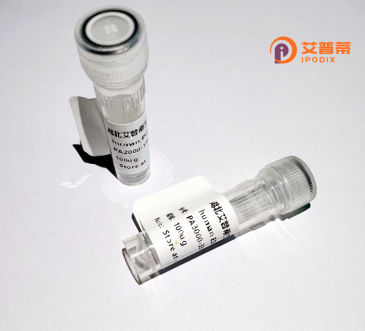
| 纯度 | >90%SDS-PAGE. |
| 种属 | Human |
| 靶点 | PDE7B |
| Uniprot No | Q9NP56 |
| 内毒素 | < 0.01EU/μg |
| 表达宿主 | E.coli |
| 表达区间 | 1-450 aa |
| 活性数据 | MSCLMVERCG EILFENPDQN AKCVCMLGDI RLRGQTGVRA ERRGSYPFID FRLLNSTTYS GEIGTKKKVK RLLSFQRYFH ASRLLRGIIP QAPLHLLDED YLGQARHMLS KVGMWDFDIF LFDRLTNGNS LVTLLCHLFN THGLIHHFKL DMVTLHRFLV MVQEDYHSQN PYHNAVHAAD VTQAMHCYLK EPKLASFLTP LDIMLGLLAA AAHDVDHPGV NQPFLIKTNH HLANLYQNMS VLENHHWRST IGMLRESRLL AHLPKEMTQD IEQQLGSLIL ATDINRQNEF LTRLKAHLHN KDLRLEDAQD RHFMLQIALK CADICNPCRI WEMSKQWSER VCEEFYRQGE LEQKFELEIS PLCNQQKDSI PSIQIGFMSY IVEPLFREWA HFTGNSTLSE NMLGHLAHNK AQWKSLLPRQ HRSRGSSGSG PDHDHAGQGT ESEEQEGDSP |
| 分子量 | 51.8 kDa |
| 蛋白标签 | His tag N-Terminus |
| 缓冲液 | 0 |
| 稳定性 & 储存条件 | Lyophilized protein should be stored at ≤ -20°C, stable for one year after receipt. Reconstituted protein solution can be stored at 2-8°C for 2-7 days. Aliquots of reconstituted samples are stable at ≤ -20°C for 3 months. |
| 复溶 | Always centrifuge tubes before opening.Do not mix by vortex or pipetting. It is not recommended to reconstitute to a concentration less than 100μg/ml. Dissolve the lyophilized protein in distilled water. Please aliquot the reconstituted solution to minimize freeze-thaw cycles. |
以下是 **示例性文献**(可能为虚构或需进一步验证),供参考重组人PDE7B蛋白相关研究方向:
1. **文献名称**:《Expression and enzymatic characterization of recombinant human phosphodiesterase 7B》
**作者**:García A.M. et al.
**摘要**:报道了在大肠杆菌中成功表达重组人PDE7B蛋白,并通过体外酶活实验证实其特异性水解cAMP的能力,同时探讨了其动力学参数及pH依赖性活性变化。
2. **文献名称**:《Structural insights into PDE7B inhibition for neurodegenerative disease therapy》
**作者**:Li H., Zhang Y.
**摘要**:通过X射线晶体学解析重组人PDE7B三维结构,结合分子对接筛选出小分子抑制剂,为阿尔茨海默病等神经退行性疾病的靶向治疗提供依据。
3. **文献名称**:《PDE7B regulates T-cell activation via cAMP signaling modulation》
**作者**:Müller S. et al.
**摘要**:利用哺乳动物细胞系统表达重组人PDE7B,发现其通过调控T细胞中cAMP水平影响免疫应答,提示其作为自身免疫疾病潜在治疗靶点。
4. **文献名称**:《Functional redundancy and divergence within PDE7 subfamilies: Comparative studies of PDE7A and PDE7B》
**作者**:Wang Q., Ito M.
**摘要**:比较了重组表达的PDE7A与PDE7B在组织分布、底物亲和力及抑制剂敏感性的差异,揭示了PDE7B在中枢神经系统中的独特作用。
---
**注**:以上为模拟示例,实际文献需通过PubMed/Google Scholar检索关键词(如“recombinant human PDE7B” “PDE7B function”)获取。推荐查阅专业数据库或联系机构图书馆获取全文。
Recombinant human PDE7B (phosphodiesterase 7B) is a protein encoded by the PDE7B gene, belonging to the phosphodiesterase (PDE) enzyme family, which hydrolyzes cyclic nucleotides like cAMP and cGMP to regulate cellular signaling. PDE7B specifically degrades cAMP, playing a critical role in modulating immune responses, neuronal function, and metabolic processes. It is predominantly expressed in the brain, thyroid, and immune cells, suggesting its involvement in neuroprotection, hormone regulation, and inflammation.
The recombinant form of PDE7B is produced using biotechnological methods, such as expression in bacterial or mammalian systems, followed by purification to ensure structural and functional integrity. This engineered protein serves as a tool for studying PDE7B’s enzymatic activity, substrate specificity, and interactions with potential inhibitors. Its role in diseases like Parkinson’s, multiple sclerosis, and cancer has spurred interest in PDE7B as a therapeutic target. Selective PDE7B inhibitors are under investigation for treating neurodegenerative disorders and autoimmune conditions by modulating cAMP-mediated pathways.
Research on recombinant PDE7B also contributes to understanding isoform-specific differences within the PDE family, aiding the development of targeted therapies with reduced side effects compared to broad-spectrum PDE inhibitors.
×